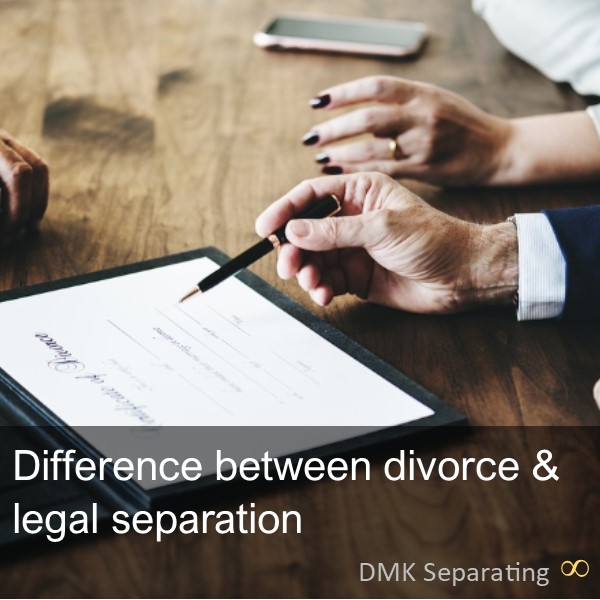A divorce and legal separation are nearly the same. But there are differences that may affect your decision in choosing which is right for you and your spouse.
Three major differences between legal separation and divorce
- While legally separated, neither spouse can remarry.
- Usually, a legal separation will allow most couples to maintain health insurance and possible financial benefits as a married couple that would be discontinued or modified if the couple divorced.
- The terms in the separation agreement can still be changed when establishing the terms in the settlement agreement or by a judge's decision made part of the Final Judgment of Divorce. Once the terms of the separation agreement are established and part of the final judgement, they are much harder to modify and require approval of the court. Appeals are often expensive and unless there is new evidence and/or wrongdoing by the judge, very unlikely to yield positive results for the plaintiff.
Divorce and Legal Separation Explained
A legal separation is usually the beginning of the end for many marriages. However, it does not need to end in divorce. It can be established and maintained indefinitely.
Many states require a legal separation for a period of time, often one year or less, prior to moving forward with divorce proceedings. Each state has specific laws about what qualifies as a legal separation. So, it's important to locate current information related to state laws and regulations regarding family law and/or seek the advice of a local attorney.
If the couple follows the state guidelines used to maintain a legal separation or separation as defined by the state satisfying corresponding requirements to divorce, the couple can usually proceed to divorce upon establishing terms.
Separation
Nearly all divorcing couples will separate, but not all couples who separate will get a divorce. Some couples legally separate in order to work on their marriage or determine if it can be saved. In addition to other divorce situations, these types of separations usually work best when a legal separation agreement is established.
The legal separation agreement provides terms that establish support, custody, division of property/debts and other rights while separated. You do not need a separation agreement in some situations. The need is based on the couple's specific circumstances, goals and potential longevity of their divorce.
Divorce
A divorce establishes a legal end of a marriage and terms accepted by both spouses. Just like a separation agreement, the terms can be established through negotiations, family court, mediation or other competent body. They are set forth in the divorce decree, the court's formal order of the dissolution of marriage. It is very uncommon for terms of the divorce to modified after a divorce is finalized. Upon a divorce, both spouses may legally remarry.
Know state laws
There are specific guidelines that must be followed to establish the separation for the satisfaction of the state's requirements to divorce. It's very important couples understand the laws and requirements in their jurisdiction regardless of their intent to reconcile in order to avoid a longer separation/waiting period if the reconciliation is unsuccessful, as well as to ensure the terms are enforceable if either spouse fails to perform on the agreement when established outside of a court order.
Separation agreements do not always need to be approved by a court
In many states, a couple can negotiate, develop, sign, date and have notarized a separation agreement on their own. This becomes a contract between two parties. In this case, if one party does not abide by the terms, the other spouse would have to sue him/her in a separate action for violation of the agreement.
If the couple enlists the help of one or more attorneys who process the agreement through the courts and it becomes a court order, either spouse could be found in contempt if he/she violates the agreement.
Religion vs. Divorce and Separation
Many world religions do not accept divorce and have rules against it and remarriage as accepted by their Church. Some have established protocols to seek approval for a divorce or remarriage. See the 2019 DMK Article Religion vs. Divorce. Some religions are more lenient regarding separation.
Some couples choose legal separation so that the terms of separation can be established (like in a divorce) without challenging their religious beliefs. However, many churches/religions against divorce do not regard the legal/civil dissolution anyway. Consult an officer of your Church for more information regarding religious guidelines.
Click here for more information related to separating.
Disclaimer
The information provided by respective owner's ("we", "us" or "our) on Divorce Me Knot (referenced also as "DivorceMeKnot.com", "dmk", "DMK", "OurDMK.com", "OurDMK", "application" or "site") is for general informational purposes only and is subject to change with or without notice. All information on our site and application is provided in good faith, however we make no representation, guarantee or warranty of any kind, express or implied, regarding the accuracy, validity, adequacy, reliability, availability or completeness of any information on the site or application.
The information in articles and all content on this site should not be considered psychological or behavioral health therapy, counseling or legal, financial, real estate, mortgage, insurance or professional advice. It should not be used in place of professional advice from a counselor, therapist, physician, behavioral health professional, legal, real estate, mortgage, insurance, financial advisor or other licensed professional or credentialed expert in related subject matters. Providers of content on this site, herein known as "Contributors" (inclusive of, but not limited to writers, bloggers, editors, employees, developers, graphic designers, advertisers, partners, affiliates, references, experts, professionals and site owners) are not legally liable for any misinformation, errors or omissions.
Under no circumstances should DMK and/or it's Contributors have any liability to users of the site for any loss or damage incurred to users as a result of the use of this site or application or reliance of any information provided on the site or application. Use of the site or application and reliance on any information from the site or application is solely at the user's own risk.
For complete site disclaimers review "Disclaimers" on this site or click the link below.
Read Complete Site Disclaimers Here



 How to resolve AdBlock issue?
How to resolve AdBlock issue?